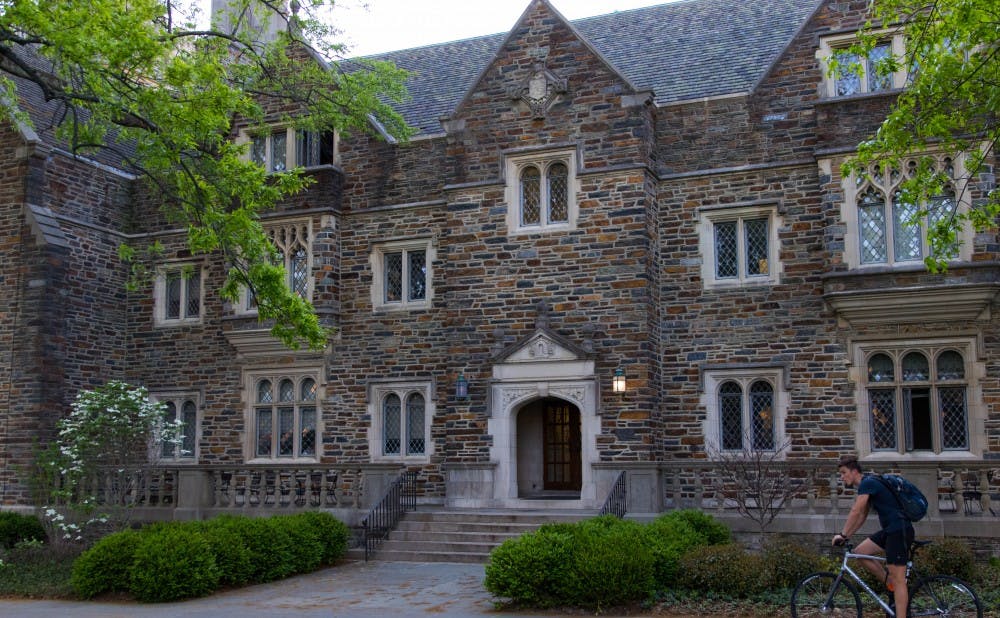Duke is one of 16 major universities in the United States being sued for alleged antitrust violations because of how they work together to determine financial aid for students, the Wall Street Journal reported Monday morning.
The universities engaged in price fixing and unfairly limited aid by relying on a shared method to calculate applicants’ financial needs, according to a lawsuit filed in Illinois federal court late Sunday.
The complaint alleges that by eliminating price competition, the 16 universities have artificially inflated the price of attendance for financial aid recipients. Over almost 20 years, the schools have overcharged 170,000 financial aid recipients by “at least hundreds of millions of dollars.”
The plaintiffs are five former students who attended some of the universities involved in the lawsuit, per the complaint. One of the plaintiffs, Sia Henry, graduated from Duke in 2011.
According to the complaint, the universities are members of the “568 Presidents Group,” in which they have agreed on the “Consensus Approach,” which is “a set of common standards for determining the family's ability to pay for college.”
The restraint of interstate trade and commerce is a violation of Section 1 of the Sherman Act, which outlaws "every contract, combination, or conspiracy in restraint of trade," and any "monopolization, attempted monopolization, or conspiracy or combination to monopolize."
Duke has been a member of the 568 Cartel since 1998, per the complaint. The cartel adopted the Consensus Methodology in 2003.
The universities would be immune from violating antitrust laws if they had complied with the 568 Exemption, which “allowed the 568 Cartel members to eliminate incentives to compete if all of the members admitted all students on a need-blind basis,” the complaint reads. However, at least nine of the schools involved, including Duke, have not qualified for the exemption because they “made admissions decisions taking into account the financial circumstances of applicants and their families, through policies and practices that favored the wealthy.”
The complaint cites “The Price of Admission,” a book by journalist Daniel Golden, which states that Duke “enrolled thousands of privileged but under-qualified applicants with no prior ties to the University in the expectation of parental payback.” Duke accepted at least 100 non-alumni children each year “due to family wealth,” and in some years, at least three to five percent of Duke’s student body consists of students “who would have been turned away without pressure from the development office,” according to Golden.
Former Duke President Richard Brodhead admitted during his tenure that “it would be naïve to say that any university should pay no attention to a family’s ability to help the university,” the complaint alleges. He said that a family’s ability to donate to Duke was a “plus factor” in admissions.
Additionally, Jean Scott, a former director of undergraduate admissions at Duke, estimated that a “couple of hundred” applicants a year “received special attention as children of prospective donors,” according to the complaint. Scott said that there “were certainly students who got in because they were a high priority” for fundraising.
There “was more of this [fundraising-related] input at Duke than at any other institution I ever worked for,” Scott said, per the complaint.
The other 15 universities involved in the lawsuit are Brown University, California Institute of Technology, University of Chicago, Columbia University, Cornell University, Dartmouth College, Emory University, Georgetown University, Massachusetts Institute of Technology, Northwestern University, University of Notre Dame du Lac, University of Pennsylvania, Rice University, Vanderbilt University and Yale University.
“These elite institutions occupy a place of privilege and importance in American society. And yet these same Defendants, by their own admission, have participated in a price-fixing cartel that is designed to reduce or eliminate financial aid as a locus of competition, and that in fact has artificially inflated the net price of attendance for students receiving financial aid,” the complaint reads.
Duke declined to comment on the allegations, per Michael Schoenfeld, vice president for public affairs and government relations.
The lawsuit, dubbed the "568 Cartel Lawsuit," now has its own website run by litigators and law firms involved in the suit. The website encourages students who attended or began attending any of the 16 universities after 2003 and received a grant but still paid some of their tuition, room or board to contact the legal team at CollegeFinancialAid@bm.net.
Editor's note: This article was updated Monday evening to include information about the 568cartel.com website.
Get The Chronicle straight to your inbox
Sign up for our weekly newsletter. Cancel at any time.

Leah Boyd is a Pratt senior and a social chair of The Chronicle's 118th volume. She was previously editor-in-chief for Volume 117.

